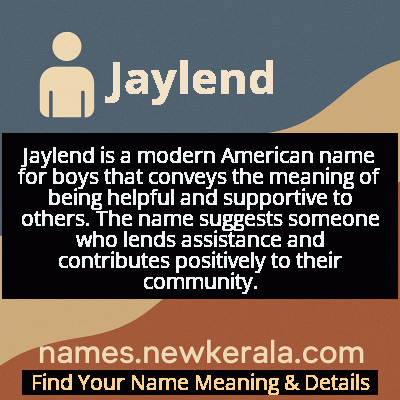Jaylend Name Meaning & Details
Origin, Popularity, Numerology Analysis & Name Meaning of Jaylend
Discover the origin, meaning, and cultural significance of the name JAYLEND. Delve into its historical roots and explore the lasting impact it has had on communities and traditions.
Name
Jaylend
Gender
Male
Origin
American
Lucky Number
8
Meaning of the Name - Jaylend
Jaylend is a modern American name for boys that conveys the meaning of being helpful and supportive to others. The name suggests someone who lends assistance and contributes positively to their community.
Jaylend - Complete Numerology Analysis
Your Numerology Number
Based on Pythagorean Numerology System
Ruling Planet
Saturn
Positive Nature
Ambitious, efficient, realistic, and authoritative.
Negative Traits
Materialistic, stressed, confrontational, and can be overly ambitious.
Lucky Colours
Dark blue, black.
Lucky Days
Saturday.
Lucky Stones
Blue sapphire, amethyst.
Harmony Numbers
2, 4, 6.
Best Suited Professions
Business leaders, managers, financial services, law enforcement.
What People Like About You
Leadership, determination, organizational skills.
Famous People Named Jaylend
Jaylend Alvarez
High School Football Player
Inspired community support after serious injury, became symbol of resilience
Jaylend Polanco
Community Activist
Founded youth mentorship programs in urban communities
Jaylend Smith
Musician
Independent artist known for community-focused lyrics and charity work
Name Variations & International Equivalents
Click on blue names to explore their detailed meanings. Gray names with will be available soon.
Cultural & Historical Significance
The creation of such names demonstrates American cultural dynamism and the desire to imbue children's identities with purposeful, contemporary significance from birth. Jaylend specifically embodies the value placed on community support and mutual aid within modern American society, particularly in urban and diverse communities where supportive networks are essential. The name's construction follows patterns seen in other modern American names that blend sounds and meanings to create unique identities while maintaining phonetic accessibility and positive connotations.
Extended Personality Analysis
Individuals named Jaylend are often perceived as naturally helpful and community-oriented, with an innate desire to support others in both personal and professional contexts. They typically exhibit strong interpersonal skills, making them effective communicators who can bridge divides and bring people together. Their helpful nature often manifests as practical problem-solving abilities and emotional intelligence, allowing them to assess situations and provide meaningful assistance.
Jaylends tend to be reliable team players who prioritize collective success over individual achievement, though they also demonstrate quiet confidence in their own capabilities. This combination of supportive demeanor and competence makes them valued friends, family members, and colleagues who others frequently turn to for guidance and assistance. Their personality often balances warmth with practicality, creating approachable yet effective helpers in various situations. While they may not seek the spotlight, their consistent reliability and genuine concern for others' wellbeing make them foundational members of their social and professional circles.
Modern Usage & Popularity
Jaylend remains a relatively uncommon but steadily used name in contemporary American naming practices, primarily appearing in diverse urban communities where creative name formations are celebrated. The name has maintained consistent but low usage since the 1990s, never reaching the popularity charts but appearing regularly in birth records across various states. Its usage reflects parents' desire for unique yet meaningful names that combine modern sounds with positive connotations. Recent trends show slight increases in usage among parents seeking names that emphasize community values and supportive qualities, particularly in the post-2020 era where mutual aid and community support gained renewed importance. The name is most prevalent in states with significant African American populations, particularly in the Southeast and urban centers, where it aligns with cultural naming traditions that value innovation and meaningful construction while maintaining distinct American identity.
Symbolic & Spiritual Meanings
Symbolically, Jaylend represents the concept of mutual support and community interdependence, embodying the idea that strength comes from collective effort rather than individual achievement. The name evokes images of extended hands, shared resources, and emotional support networks that sustain communities through challenges. Metaphorically, it suggests a bridge between people—someone who connects those in need with available help and resources. The 'lending' aspect symbolizes temporary assistance that empowers others rather than creating dependency, reflecting healthy community dynamics where support flows in multiple directions. In broader symbolic terms, Jaylend represents the modern understanding of success as something built through cooperative effort and the recognition that helping others ultimately strengthens the entire community. This makes the name particularly resonant in contemporary society where social connectivity and mutual support are increasingly valued as essential components of individual and collective wellbeing.

